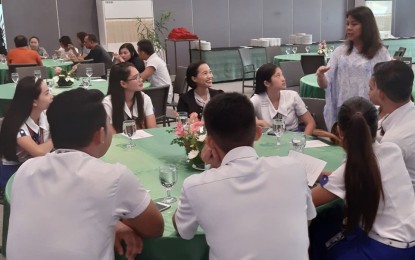
FIGHT VS. FAKE NEWS. Presidential Communications Operations Office (PCOO) Undersecretary Lorraine Marie T. Badoy (right, standing) interacts with students from different colleges and universities in Bohol on the sidelines of the Asean Awareness Forum held at Bellevue Pavilion in Panglao Island, Bohol Friday (Nov. 22, 2019). Badoy said information ministers attending the Asean Senior Officials Meeting Responsible for Information (SOMRI) on Nov. 19 to 22, 2019 successfully tackled regional cooperation and member states' initiatives in combating fake news. (PNA photo by John Rey Saavedra)
CEBU CITY -- Information officers from the Association of Southeast Asian (Asean) have successfully tackled national initiatives in addressing the proliferation of fake news in the region.
During the 5th Meeting of the Asean Senior Officials Meeting Responsible for Information (SOMRI) – Working Group on Information, Media, and Training (WG-IMT) held in Panglao, Bohol from Nov. 19-22, information executives discussed regional cooperation and member states’ initiatives in addressing disinformation campaigns.
Undersecretary Lorraine Marie T. Badoy, head of the new media and external affairs of the Presidential Communications Operations Office (PCOO), said in her remarks during the Asean awareness forum at Bellevue Pavilion in the resort island that discussions on fake news took center stage in the working group’s meeting.
“One of our biggest aims in the information sector is to create a cyber ecology that is more in keeping with who we are, our nobility and all these great traits about humans rather than the dark side of humanity because we cannot anymore stop it because the age of information is upon us,” Badoy said.
She warned about the ill effects of the internet in the lives of the Asean people when it is being used to propagate fake news.
“The internet is the new fire of humanity and we need to use it ably well and together with the age of information, the shadow side of it is. With us in the Asean, (in) the age of information, lives can be destroyed, governments can be toppled, and you have heard of suicide because of cyber-bullying. This is the kind of world that’s being created and those of us who are here, those of us who can push back should push back,” Badoy said.
As the senior official representing the Philippines to the meeting, she underscored the need “to create a world that is more in keeping with our values” and respectful, smart and safe to the netizens.
Apart from the Asean regional cooperation and member states’ national initiatives in addressing fake news, three more important subjects were successfully tackled during the meeting.
Rhea Kristine Cy, focal person for Asean of the Philippine Information Agency (PIA), told the Philippine News Agency (PNA) on the sidelines of the awareness forum that the working group on information, media and training also discussed the progress of implementation of the Asean Strategic Plan for Information and Media 2016-2025 and the Asean Communication Master Plan 2 (2018-2025).
Cy said updates on promotion of media and information literacy in the region, including the ASEAN #cyberREADI campaign (Asean Core Values on Digital Literacy – Responsibility, Empathy, Authenticity, Discernment, and Integrity) were also tackled.
The information officials also agreed on salient points on cooperation in information and media with dialogue partner-countries including China, Japan, and the Republic of Korea.
Meanwhile, Badoy also warned about the exploitation of Filipino children using the internet.
“The Philippines, our country, is the global epicenter for online sexual exploitation of children, which means that we are number one in the world. Our children are preferred sexual toys of these predators across halfway around the world,” she said. (PNA)
